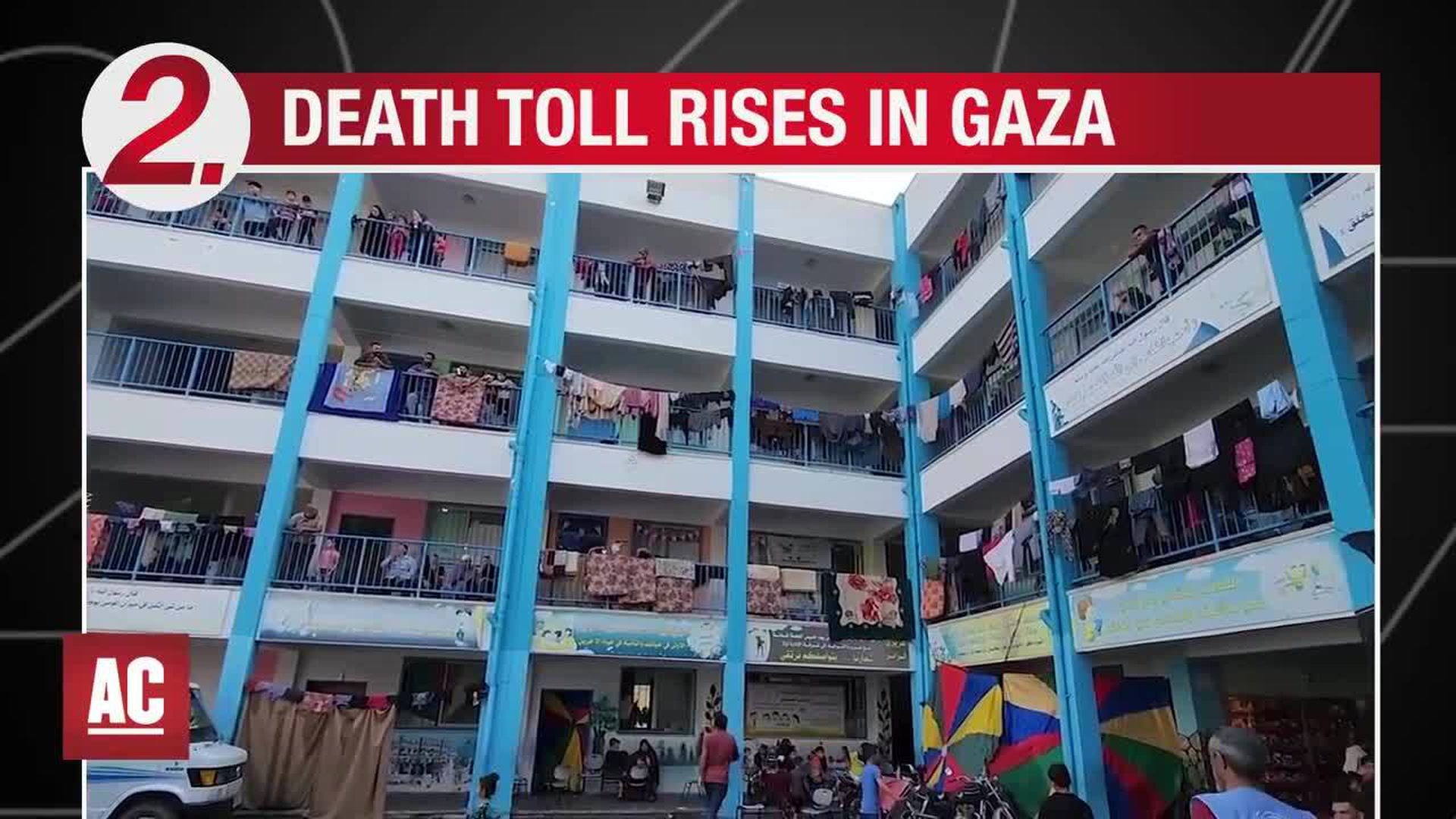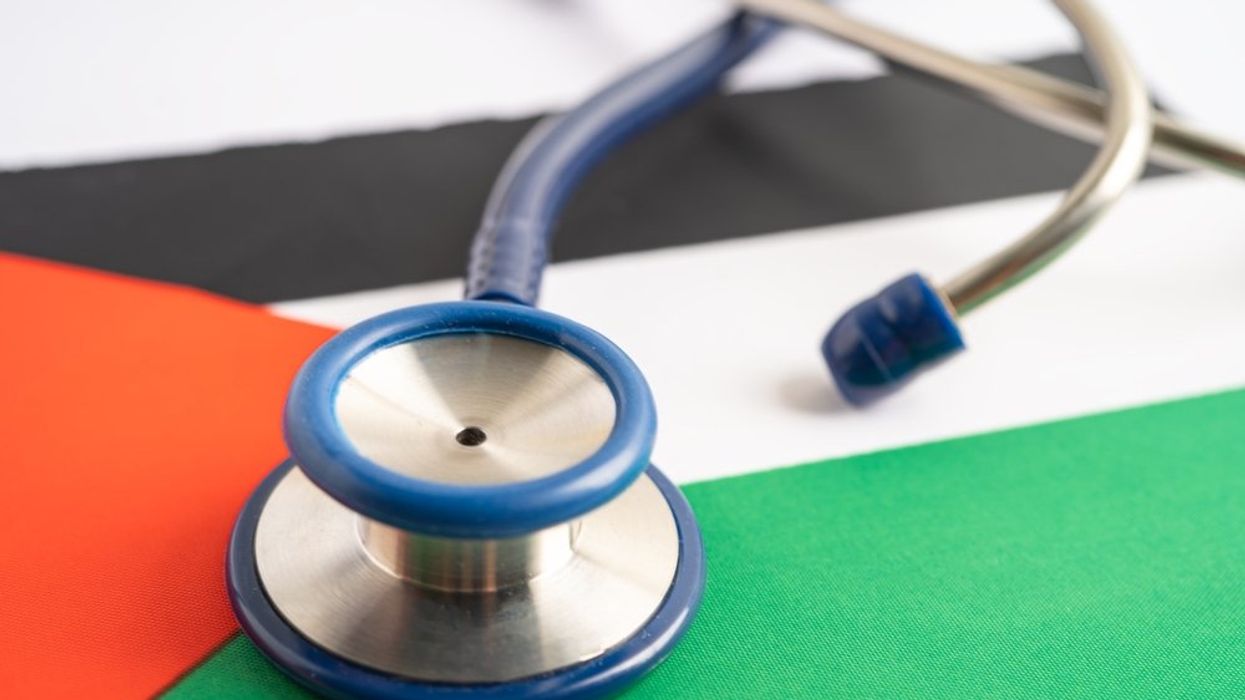
Video Source: Advocate Channel
(CNN) — Aschool and a hospital in Gaza were among the places lethally blasted by airstrikes on Tuesday as humanitarian concerns mount over ongoing deprivation of food, fuel, and electricity to the isolated population.
The strike on Al-Ahli Baptist Hospital in Gaza is likely to have killed hundreds, the Palestinian Health Ministry said in a statement, adding that there are still many people under the hospital rubble. CNN has asked the IDF for comment on hospital strike.
Gaza has been under siege by Israel for more than a week, in response to the deadly incursion by Hamas, the Islamist militant group that controls the coastal enclave, home to 2.2 million people. Hospitals meanwhile are struggling to tend to the wounded across the territory, operating with shortages of electricity and water.
Vital humanitarian aid is meanwhile piling up at Gaza’s shuttered border, despite diplomatic efforts to open a corridor from Egypt. UN and other officials have said they need assurance of safe passage for any potential aid convoys.
Amid growing international pressure to address the crisis, US President Joe Biden will travel to Israel on Wednesday, an extraordinary wartime visit that follows intense efforts by Secretary of State Antony Blinken across the Middle East.
Israeli and US officials on Tuesday said humanitarian aid would be allowed into southern Gaza, but Israel’s national security adviser warned it would be stopped if Hamas intervened.
UN spokesman Stephane Dujarric said on Tuesday “intense discussions” are underway regarding the agency’s aid efforts in Gaza.
However, it is unclear if any progress was made on the opening of the Rafah crossing, the only entry point to Gaza not controlled by Israel.
A Palestinian border official told CNN on Saturday that concrete slabs had been placed at the crossing, blocking all gates; Egypt, meanwhile, claims that Israeli airstrikes on the Gaza side of the border have made roads inoperable.
Satellite images provided by Maxar Technologies show four 30-foot (9-meter) craters blocking the roadway at the border crossing closest to the Egyptian gate, along with the concrete slabs.
Hospitals will be ‘thrust into darkness’
Urgent calls for help are growing on both sides of the crossing.
On the Egyptian side,United Nations teams are waiting at the Rafah crossing,hoping they will be given the green light to enter Gaza and open a humanitarian corridor.
In Gaza, 20 out of 23 hospitals were offering partial services because fuel reserves are “almost totally depleted,” the UN Relief and Works Agency (UNRWA) warned on Tuesday.
“Critical life support systems will shut down and these hospitals – which are filled with the chronically ill and civilian casualties of war – will be thrust into darkness,” the agency said.
WHO spokesperson Margaret Harris told CNN the UN health agency had struck an agreement with Egypt’s President Abdel Fattah El-Sisi to open the Rafah crossing for aid – but Israel’s strikes rendered the facility unsafe, thereby halting the movement of crucial supplies.
There are about 84,000 pregnant women in Gaza, with many delivering every day, Harris said. “Babies don’t care about bombs, they come when they come.”
The World Food Programme (WFP) warned on Tuesday shops have been unable to replenish supplies and will run out of available food stocks in “less than a week.”
UN humanitarian envoy Martin Griffiths is expected to travel to Cairo on Tuesday to aid diplomatic efforts, his office said. His trip will include a visit to Israel.
A convoy of trucks carrying aid supplies was traveling through Egypt toward the crossing early Tuesday, according to state-affiliated media outlet Al-Qahera News. Much of the aid already arrived days ago, sent by multiple countries and international organizations.
On the Gaza side, large numbers of evacuees have gathered by the crossing, part of the mass displacement that has seen at least 1 million people flee their homes in the past week alone, according to UNRWA.
One family of five Palestinian-Americans, all US citizens, drove to Rafah on Monday after hearing the borders would be opened but to no avail, said Haifa Kaoud, whose husband Hesham is among the five stuck in Gaza.
The family had been visiting relatives in Gaza when the war broke out; now, their loved ones in the US are desperately trying to find ways to bring them home as they face shrinking supplies of vital medication, clean water and electricity.
UNRWA said Tuesday that Gaza’s last seawater desalination plant had shut down, bringing the risk of further deaths, dehydration and waterborne diseases.
The UN agency added that one line of water was opened for three hours in southern Gaza on Monday, serving just half the 100,000 population of Khan Younis.
Rising death toll
Over a week of Israeli bombardment has killed at least 3,000 people, including 1,032 girls and 940 boys, and wounded 12,500 in Gaza, the Palestinian Ministry of Health said Tuesday.
On Tuesday, Israeli strikes on two densely populated refugee camps and an UNRWA school housing displaced people in central Gaza killed at least 18 people and injured scores, Palestinian officials said.
The IDF confirmed that high-level Hamas commander Ayman Nofal was killed in the airstrikes in Gaza on Tuesday.
In the occupied West Bank at least 61 people have been killed, the Palestinian Ministry of Health said on Tuesday. At least 20 humanitarian workers from the UN, the Red Cross and the Red Crescent have been killed in Gaza, the UN said.
Casualties in Gaza over the past 10 days have now surpassed the number of those killed during the 51-day Gaza-Israel conflict in 2014.
On Monday, the UN Security Council rejected a Russian resolution calling for a humanitarian ceasefire after it failed to get enough votes. Several countries including the US, the United Kingdom and France voted against it because the draft did not condemn Hamas for the October 7 attack, which the Israel Defense Forces (IDF) said killed at least 1,400 people with scores taken hostage.
The family of a French-Israeli woman, Mia Schem, who was shown in the first hostage video released by Hamas, pleaded with world leaders “to bring my baby back home.”
CNN cannot independently verify where and when the video of Schem, 21, was taken and what condition she is currently in.
Her mother, Keren Scharf Schem, told reporters on Tuesday she did not know if her daughter was dead or alive until Monday and that all she knew is that she might have been kidnapped.
‘No safe shelters’
Relief workers across Gaza say they are desperately struggling to run emergency services with dwindling medical supplies, as displaced Palestinians continue to be struck by Israeli shelling.
“Yesterday [Monday] they [Israeli authorities] told us to evacuate, but we are the only hospital in the area who are providing emergency services to people, so we refused,” Dr Jamal Hams, medical director of the Kuwaiti Hospital in Rafah, in southern Gaza, said.
“There is no electricity, there is no water, there is no food, there are no drugs, no medications, it’s very difficult you cannot imagine,” he told CNN on Tuesday.
“The medical team are exhausted, we have no medical supplies and are suffering so much,” Hams added. “It’s a living disaster.”
Some Palestinians who fled to southern Gaza, after the IDF told them to leave northern regions, were killed by Israeli strikes at evacuation sites, according to Mahmoud Shalabi, the senior programme director for Medical Aid for Palestinians (MAP).
In one instance, a doctor working inside Al-Aqsa Hospital told Shalabi 80 Palestinians were killed, including 60 who were internally displaced people from Gaza City.
The doctor was working in the largest hospital in central Gaza, located south of Wadi Gaza, where the Israeli military encouraged civilians to flee for safety ahead of an anticipated ground assault.
“Many internally displaced people have died last night in those alleged safe areas,” Shalabi said on Monday. “When the Israelis are talking about safe shelters, there are no safe shelters.”
The director of Gaza hospitals, Dr. Mohammad Zaqout, told CNN on Tuesday morning that since midnight hospitals had received 110 bodies from different areas of south Gaza
Zaqout said 40 bodies had been received at al Nasser hospital, while 60 victims of air strikes in Rafah had been received at al Najar hospital. Another ten bodies had arrived at the European hospital, he said.
Some of the victims had sheltered with family members or relatives after they fled northern Gaza.
The Palestinian Interior Ministry said Israeli airstrikes had killed at least 49 people in strikes on the southern Gaza cities of Rafah and Khan Younis.
IDF spokesperson Lt. Col. Jonathan Conricus told CNN he was “not aware of any strikes specifically in those areas but they could have happened,” pointing to the IDF’s military operation against Hamas.
Fears of regional conflict
Regional leaders raised concerns of fighting between Israel and Lebanon’s powerful Iran-backed Hezbollah in the north, and Syria, as strikes at the border become a flashpoint for wider conflict.
The IDF said on Tuesday shots were fired towards several locations on the security fence between Israel and Lebanon.
At the same time, Iranian Supreme Leader, Ali Khamenei, warned if the “atrocities” against Gaza persist, “Muslims and resistance forces could lose patience,” and no-one would be able to prevent their actions.
After Hamas’ incursion on October 7, Palestinian militants fired shots from Lebanon that were intercepted by Israel, leading to a deadly exchange of fire.
On Friday evening local time an Israeli strike killed Reuters journalist Issam Abdallah who was also from south Lebanon. The assault wounded at least six other reporters.
A CNN video analysis found that the journalists were wearing vest jackets clearly marked as press.
And on Tuesday, Israeli strikes killed at least four people in Alma al-Shaab, in southern Lebanon, the Lebanese Red Cross said.
Two Hezbollah fighters were killed in confrontations on Tuesday, the militant group said. It is unclear whether they are part of the death toll reported by the Red Cross.
The-CNN-Wire
™ & © 2023 Cable News Network, Inc., a Warner Bros. Discovery Company. All rights reserved.
- Israel Orders 1.1 Million Gazans to Evacuate, UN Warns of 'Devastating Humanitarian Consequences' ›
- Bernie Sanders Condemns Israel's Seize of Gaza as ‘Serious Violation of International Law’ ›
- Israeli Air Strikes and Seize of Gaza Condemned as 'War Crimes' ›
- Palestinians Lament Israeli Airstrikes Endangering Civilians in Gaza: 'We're Not Hamas' ›
- Israel Cuts All Communications in Gaza, Drastically Escalates Bombings ›
- Israel Faces Condemnation For Strike on Gaza Refugee Camp ›


















































